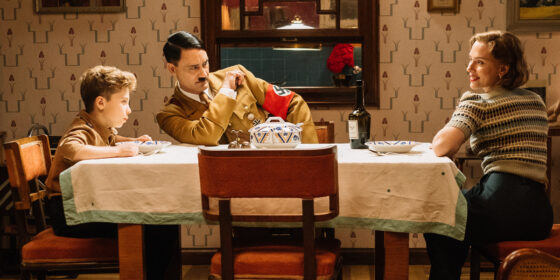Jojo Rabbit (Taika Waititi, US) — Special Presentations

By Adam Nayman
With five minutes to go in Jojo Rabbit, I laughed out loud. One of the actors (not one of the famous ones) got off a good line reading, and my response, fully audible and totally involuntary, filled me with shame. (I actually apologized to my seatmate, who will remain nameless but successfully pitched a no-hitter as far as I could tell.)
Sitting in an emotionally pushy movie that people around you are enjoying—not only laughing at, but crying with, and sometimes at the same time, as desired by shameless entertainments of varying worthiness from The Great Dictator to Life is Beautiful—is a truly alienating experience. In truth, I’m much more interested in interrogating the disparity between these responses than summarizing much about the plot or characters or style of Taika Waititi’s coyly calculated coming-of-age-comedy, which arrives at the place where good intentions lead early and stays there for 108 minutes.
Conceptually, the movie is sound in a craftsmansly sort of way, with a prepubescent Hitler Youth being de-radicalized by prolonged exposure to the attractive Jewish teenager being secreted away in the attic by his mother, who works with the German anti-Nazi resistance; the womens’ real, feminine, flesh-and-blood empathy works against the cartoonishly murderous exhortations of the kid’s fantasy projection of Hitler (played with almost heroic and definitely unintentional unfunniness by Herr Direktor, who ain’t no Charlie Chaplin). The story works towards the same ultimate moral as Drop Dead Fred: that there comes a time when we must put away imaginary friends.
If I had to choose, these bowdlerizing, tear-jerking domestic scenes are preferable to the Wes Andersonian kitsch showcased in the movie’s ad campaign, all of which is extremely easy to not laugh at. All of it, though, comes from the same place of cozy smugness masquerading as cautionary humanism, a vibe that sets in early and never once goes away. If all of Waititi’s smirking fascist slapstick is meant to take away Hitler’s power 70 years after the fact—or to make his present-day inheritors in Germany and Trump’s America look like fools—it’s the satirical equivalent of dunking on a two-foot hoop (or a basketful of deplorables). If the juxtaposition of SNL-level gags with faux-austere renderings of death plays as powerful, it’s just more evidence (as if it was needed) about the easy, insidious mechanics of exploitation. It’s hard, at the end of the day, to truly hate a movie—even a self-branding “anti-hate satire”—that has time for Rilke’s poetry and David Bowie’s “Heroes” and the tenderness of a mother constantly tying her absent-minded son’s shoes as a silent gesture of love; hate, the film tells us, is not only a bad thing (which is fair enough), but also a lot of effort. As far as I’m concerned, though, in this case it’s worth it.
Adam Nayman

